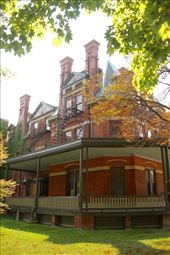FRANK LLOYD WRIGHT WOULD NOT HAVE APPROVED. Although Pullman, Illinois is just a few miles from some of his more famous creations, the town of Pullman was at the opposite end of the architectural spectrum. Wright designed for the wealthy few — Pullman was for the working many. Wright was nationally famous but Pullman was voted the world's most perfect town at the Prague International Hygienic and Pharmaceutical Exposition of 1896.

Civic Pride
George Pullman, he of the Pullman Railroad Car, envisioned a community for workers — his workers. Homes would have gas, water and indoor plumbing, quite a luxury in the 1880s. He would furnish the community with a church and a school, with parks and a marketplace, everything, he hoped, to attract the best workers, foster harmony and, most importantly, prevent strikes.

Out of Business . . . For Now
Eventually the economy tanked, Pullman cut his workers’ hours but not their rent and they went on strike. The experiment failed. Pullman was considered just another capitalist.


Larry Lynne
Or was he? To my inner socialist — or at least liberal — mind, George was on the right track. While most industrialists couldn't care less if their workers lived in squalid tenements, visionaries like Pullman and Titus Salt from England, and more recently, Henry Kaiser, sacrificed quick profits for the health and happiness of their employees. And we can't even get affordable healthcare. Go figure!


Florence Hotel Church
Today, 400 proud Pullmanites have rehabed the row houses, cleaned up the parks and planted colorful gardens. Larry, whom we talked to in front of his home, is raising money to restore the church and another capital campaign hopes to refurbish the Florence Hotel. Lynne converted four apartments in to her dream home. Even the Park Service is renovating the former factory admin building as a future Visitors Center for the Pullman National Monument.
POST SCRIPT In the two weeks since we visited previously unheard of Pullman, we have seen stories twice on PBS about Pullman. It was one of the Ten Cities That Changed America and industrial drawings of Pullman railroad cars were valued at $10,000 on Antiques Roadshow.